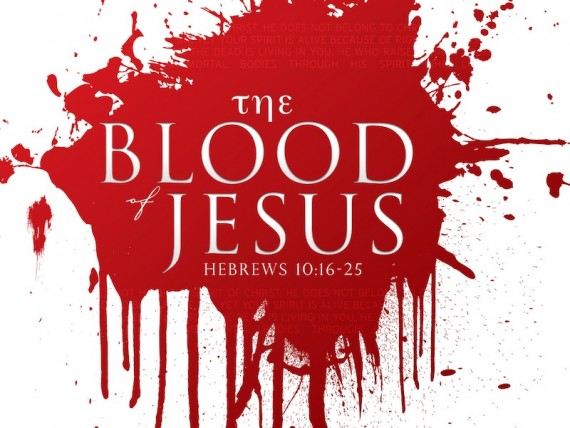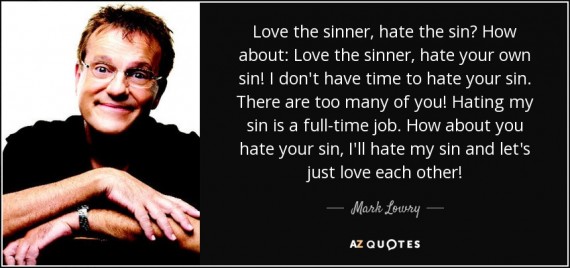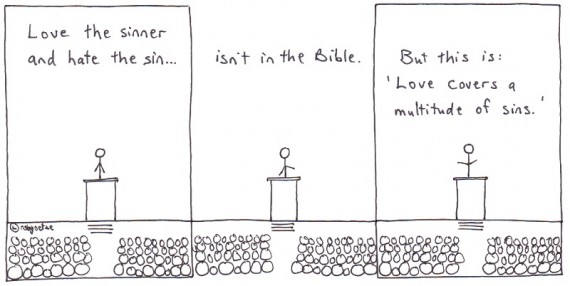Hebrews 9:22 provides the main reason Christians believe that if Jesus had not shed His blood for us, we could never have been forgiven for our sins. Hebrews 9:22 refers to Leviticus 17:11 as saying this:
… without the shedding of blood, there can be no forgiveness of sins.
So there we go! The blood of Jesus is important – necessary even – for the forgiveness of sins.
End of story. The question is answered. The post stops here.
Except … hmm … something doesn’t seem quite right with that quick and tidy answer …
For example, I forgive people all the time without requiring that they shed blood for me. And I’m really glad that people forgive me all the time without asking that I open a vein or kill my cat for them.
So if I can offer forgiveness without the shedding of blood, and so can other people, what is going on with God? Doesn’t He freely forgive (Col 3:13)? Since when are there conditions for unconditional love, grace, mercy, and forgiveness? Is God’s forgiveness of a lesser sort than ours? Or maybe His forgiveness is of a more powerful type of forgiveness that requires blood?
And if God’s forgiveness is greater and so requires blood, then my next question is, “Why blood?” I mean, if God is the one making the rules, and sin is a serious affront to His holiness, then why did He decide that blood would appease Him? Why not require … I don’t know … spit? Or hair? Yes, I like the hair idea.
Why didn’t God simply say “Without the cutting of hair, there can be no forgiveness of sins”? Of course, that might not be fair to bald people, but I digress …

What’s the deal with blood?
Yes, yes, I know. I’ve been to “the seminary.” They tell us:
It’s because the life is the blood.
That’s from Leviticus 17:11. In the Bible. And since we have a verse, the discussion is over.
But wait! That’s no answer. The question still stands. So okay, God wants blood, and it has something to do with the life of a person being in the blood. But God makes the rules, so why did He decide He wanted blood? Why does God want to kill people (or animals in the place of people) because people sin?
In fact, come to think of it, the issue isn’t with blood any more. The issue now is with God. Why does God want blood?
I could follow this line of reasoning further, but I think you get the point. In fact, some of that conversation might sound very similar to conversations you have had with atheists. At least, much of what I wrote above echoes conversations I have had with atheists. Atheists are atheists for a variety of reasons, but some of them have real issues with a god who demands blood so that He can forgive sins.
And you know what I tell them? I say this:
God Doesn’t Want Blood
God doesn’t want blood. God wants life! It is WE who think that God wants blood (when He doesn’t).
The idea of God demanding blood is borrowed from pagan religions. Jesus went to the cross, not to reinforce and support this idea, but to expose and redeem it. That’s a huge idea which would take us down a whole new rabbit trail.
 But if God doesn’t demand blood, then how does God forgive? Doesn’t Hebrews 9:22 teach that God needs blood in order to forgive us? No, it does not. Let us read carefully what Hebrews 9:22 says in context.
But if God doesn’t demand blood, then how does God forgive? Doesn’t Hebrews 9:22 teach that God needs blood in order to forgive us? No, it does not. Let us read carefully what Hebrews 9:22 says in context.
1. Hebrews 9:22 contrasts Jesus with Moses
The first thing to notice about the context of Hebrews 9:22 is that the author is clearly contrasting the sacrificial system of the Mosaic Law with what Jesus accomplished in His death on the cross.
One way to note this is by looking back to Hebrews 9:15, which is the opening statement in the larger context of this discussion about sacrifice and blood. In Hebrews 9:15, the author writes about the “redemption of the transgressions.” The word used there is not the normal word for “sin” in the NT, but is parabaino (STR: 3847), and means to overstep or go beyond the boundaries.
The TDNT says that parabaino is closely connected with sin in the New Testament, but primarily in the sense of using human tradition to disobey the law of God while claiming to be the fulfillment of the law.
In other words, parabaino takes place when someone tries to explain and apply the law of God, but actually ends up doing the exact opposite of what the law says.
The author of Hebrews indicates that Jesus came to redeem sin, that is, to redeem the parabaino type of sin. More specifically still, Jesus came to redeem the sin of misusing the law. It is this issue that concerns the author of Hebrews.
2. Hebrews 9:22 says there is purification and forgiveness Without Blood
Second, it is important to note that even in Hebrews 9:22, the author pretty adamantly states that there is purification and forgiveness apart from the shedding of blood. The author says, “almost all things are purified with blood …”
If we went back to read the Levitical law, we would see that purification and forgiveness was extended under a variety of circumstances, including the washing with water (Lev 15:16-17; 17:15), anointing with oil (Lev 14:29), burning flour (Lev 5:11-13), giving money (Exod 30:11-16), or releasing an animal into the wild (Lev 16:10).
And in fact, when it comes to intentional sins, there was no offering of any kind which was prescribed by the law. All the sacrifices and offerings of the law are for unintentional sins only. This means that when an Israelite sinned intentionally (as they most certainly did, just as we do), the only way they could receive forgiveness from God was to look to Him for it in faith (just like us)!
The author of Hebrews knows all this, which is why he says that almost all things are purified by blood.
3. Hebrews 9:22 is not about Sin; but about the Covenant
Of course, even this requires further modification, for it is not true that almost all things required blood for purification. A quick reading of the Law reveals that most things did not require blood.
So what does the author of Hebrews mean?
The context indicates that the author specifically has in mind the tabernacle and the religious items within the tabernacle (Hebrews 9:21). The author is talking about the initial dedication ceremony of the first tabernacle built by Moses. This purification and dedication ceremony initiated the Mosaic Covenant (Hebrews 9:18-19).
So the author of Hebrews is not giving a general principle in Hebrews 9:22 for how we receive forgiveness of sins, but is instead referring to how the covenant of Moses was initiated by blood.
4. Hebrews 9:22 says that Shedding of Blood came from the Law
Fourth, notice that the author of Hebrews specifically states where the instruction about offerings of blood came from. He does not say, “and God commanded that all things be purified with blood, for without the shedding of blood there is no forgiveness of sins.”
No, Hebrews 9:22 specifically states that this these things are “according to the law.” Of course, those of us who hold to the inspiration and inerrancy of Scripture don’t see much difference between something the law stated and something God stated, and yet we must be careful because numerous Old Testament prophets emphatically declared that God is not the one who gave the law or commanded that the people offer sacrifices, and He was not pleased with these sorts of religious rituals, nor did He ever want them (cf. Jer 7:21-23; Amos 5:21-24; Micah 6:6-8).
This is the same point the author of Hebrews makes in 10:5-6.
Reconciling the words of these inspired prophets with the modern understanding of inspiration and inerrancy is a difficult task indeed. I have a way that works for me, but again, to travel down that rabbit trail would take us too far afield.
But however we understand that thorny issue, we can all agree that in Hebrews 9:22, the author is simply contrasting how the law inaugurated the Mosaic Covenant with how Jesus inaugurated the New Covenant.

5. The Shedding of Blood Never Brought Forgiveness!
In light of this contrast, notice fifthly, that the author of Hebrews deftly shows how the Mosaic covenant, with all its bloody sacrifices, was never able to accomplish what it promised.
The author of Hebrews points out that it is “impossible for the blood of bulls and goats to take away sins” (Hebrews 10:4). Though it was the law that promised the forgiveness of sins through blood sacrifices, the simple fact that the law required perpetual sacrifices revealed that the law could not deliver what it promised.
Nobody was ever actually forgiven through the blood of a sacrifice! So according to the author of Hebrews, though the law required blood for forgiveness, blood didn’t provide any forgiveness! The law didn’t work!
6. Hebrews 9:22 is not about Forgiveness OF SINS
This leads to a sixth point about Hebrews 9:22 which should not be missed.
I intentionally misquoted Hebrews 9:22 above. I quoted it as saying that “without the shedding of blood there is no forgiveness of sins.”
But Hebrews 9:22 does not include those final two words. Hebrews 9:22 says nothing about sin. Yes, sin is mentioned in Hebrews 9:26-28, but only in reference to the sacrifice of Jesus. The first time the author references sin in connection to the sacrificial blood of the Mosaic covenant is in Hebrews 10:4, where, as we have just seen, the only connection between sin and blood is that sin cannot be taken away by the blood of bulls and goats.
So what is the blood for in Hebrews 9:22? Again, as we saw above, it was for the purification of the tabernacle and its vessels when Moses inaugurated the first covenant. Modern western Christians are so infatuated with sin, that we see sin everywhere and believe that our biggest problem in the world is sin and that God is sitting in heaven trying to figure out how to stop us all from sinning.
I believe that nothing could be further from the truth.
God is not nearly as concerned with sin as we are.
Before the majesty of God’s holiness and love, all the sin of the world is little more than an annoying flea jumping around on the ground by his foot. Sin is not that big of a deal for God. The only reason He is concerned at all about sin is because sin hurts and damages us, and since He loves us beyond all imagination, He wants to do something about that annoying flea, because it has bitten us and injected us with all sorts of harmful toxins.
Also, God must do something about sin because sin is a big deal for Satan, and Satan uses sin to lay claim to our lives, which is something God does not want. But this too is another rabbit trail which we must avoid for now. The bottom line is that sin is not a big deal for God, and sin is not the issue in Hebrews 9:22.
7. Hebrew 9:22 isn’t even about “Forgiveness”
But what about the word “forgiveness” in Hebrews 9:22? Doesn’t that indicate that sin is the issue? No, it does not. This is the seventh point about this important text.
The word which the author uses here is the Greek word aphesis. This word does not mean “forgiveness” in the way that modern, English-speaking people think about forgiveness. Instead, aphesis is something closer to “deliverance” or “release.”
It has in mind the picture of someone who is enslaved and in chains, and someone else come along with the key to unlock them and set them free. I have written previously about aphesis.
In Scripture, we are freely forgiven of all our sins, past, present, and future, completely and only by the grace of God. We are, however, called upon to obey God so that we might enjoy the freedom from sin that He wants for us. Sin injects us with toxins that further enslave us, which God wants to liberate us from.
This sort of release often requires something on the part of the one who is being released, lest they fall right back into slavery after having been released! In this way, aphesis is a symbiotic forgiveness. It not only requires that the liberator unlock the chains; it also requires that the liberated run away from what had chained them.

8. The “Release” of Hebrews 9:22 is a Release of the Covenant
In Hebrews 9, it is not people who are being released, but the covenant itself! This eighth point is that the blood of Hebrews 9:22 has absolutely nothing to do with the removal of sin.
Instead, the blood was for the enactment of the Mosaic Covenant. The author of Hebrews could not be more clear. He says that a testament, or will, is not put into effect until the one who wrote it dies (Hebrews 9:16-17). My wife and I have Wills, and as is the case with all Wills, they do not go into effect until we die. A “Last Will and Testament” has no power while we live.
So after Moses wrote the Covenant, or the testament, he enacted a death over it to make it effective and active upon the people (Hebrews 9:19-21).
Whose “Last Will and Testament” was this? It was God’s! It was God’s covenant to the people.
But since God Himself could not come down to die and so enact the covenant, Moses symbolized the death of God with “the blood of calves and goats, with water, scarlet wool, and hyssop” (Hebrews 9:19).
The “release” in Hebrews 9:22 then, is the release of the covenant.
Prior to the shedding of the blood of the bulls and goats, the covenant was not active. It was under lock and key. A death was needed to free it, liberate it, or enact it.
And since God was the “testator” (Hebrews 9:16), but God could not die, Moses killed calves and goats to symbolize the death of God, and in so doing, enacted the covenant of God with His people, Israel.
It has nothing whatsoever to do with sin.
Nor does Hebrews 9:22 have anything with the conditions of forgiveness, for as we have seen above, the covenant offered numerous ways for people to receive purification from sin, and when it came to forgiveness for intentional sins, the Israelites believed on the grace of God for forgiveness just as we do.
9. The People were also Released from Slavery
But the “remission” or “release” of Hebrews 9:22 is not just of the covenant. The implementation of the first covenant with Moses took place after the Israelite people had been delivered and redeemed from captivity in Egypt.
From a purely legal standpoint, they were runaway slaves. And according to the laws of slavery, as long as a slave is still living and has not yet been set free, the slave is still a slave, even if they run away.
So the redemption enacted as part of the Mosaic covenant was the redemption of the slaves from Egypt. The death of the calves and goats symbolized the death of the Israelite people to their former life of slavery in Egypt.
Through the Mosaic covenant, the people of Israel died to their old identification as slaves to the household of Pharaoh (i.e., Egypt), and were raised again to a new identification as members of the household of God. This is why the water and the blood was sprinkled not just on the book of the covenant, but also on all the people (Hebrews 9:19).
They were dying to their past and were being born again into a new family. As members of this new family, they had new household rules to live by, which were enumerated in the Mosaic covenant.
10. Hebrews 9:22 in the context of Hebrews 9-10
All of this together helps us understand the discussion in Hebrews 10 that follows about how the New Covenant, which was enacted through the death of Jesus, is far superior in all ways to the Old Covenant which was enacted through the blood of animals.
This also helps explain why Hebrews 10 talks about sin so much. Though we have seen that Hebrews 9:22 is not talking about the forgiveness of sins, we often get confused about the rest of Hebrews 9 and on into Hebrews 10 because there are many references to the sacrifice or offerings of Jesus Christ for our sins.

The best way to understand this is to remember what we have learned from Hebrews 9:16-22 about why the blood of the calves and goats was sprinkled over tabernacle and its instruments, along with the book of the covenant and the people, on the day the Mosaic Covenant was instituted among them. The blood was to inaugurate the covenant and indicate to the people that they had been set free from slavery.
All of this is exactly the same with the death of Jesus.
Jesus did not die to rescue us from the wrath of God. Nor did Jesus die to secure for us the forgiveness of sins. God has always freely forgiven people of their sins.
No, the death of Jesus on the cross was to inaugurate the new covenant of God with the entire world, and to indicate to all people that we were no longer slaves to sin.
That second point is critical. Jesus did not die for God because of sin. Jesus died for sin.
God’s holiness did not demand that Jesus be put to death. No, it was the devil that demanded death and blood (cf. Hebrews 2:14-15). Sin was the certificate of ownership which the devil held over the heads of humanity.
By dying, Jesus cancelled this debt of sin so that the devil could no longer have any claim upon us. This happened because just as all sinned in Adam, and so became slaves to death and the devil, so all died and were raised to new life in Jesus, and so were liberated and redeemed from our slavery to death and the devil.
Just as the Israelites in the wilderness died to Pharaoh, and were raised to new life in the family of God, so also, all people in Jesus died to sin, death, and devil, and were raised to new life in the family of God. This is the basic meaning of the discussion in Hebrews 10 about the sacrifice of Jesus for sin.
But the discussion goes beyond this as well. The author of Hebrews intentionally subverts the sacrificial elements of the Mosaic covenant by transitioning away from images of blood and death, and writing instead about offerings and purification.
Let just a few of these be noted.
Following immediately after Hebrews 9:22, we read that Jesus also purified the heavenly sanctuary. And just as the first ceremony indicated the inauguration of the Mosaic covenant and the death of the people to their past enslavement to Egypt, so also, the actions of Jesus indicated the inauguration of the New Covenant and the death of the people to their enslavement to sin.
In Hebrews 10:1-4, the author emphasizes the complete failure of the Mosaic law to do anything about sin. In Hebrews 10:2, we are informed that if the law could have taken away sin, the people would have stopped making sacrifices, for they would have had no more consciousness of sins. Yet the sacrifices themselves are a reminder of sins, even though they do nothing about the sins.
Then in Hebrews 10:5-10, the author indicates his understanding that the sacrificial system was never intended to take away sins, and that God Himself never wanted such sacrifices or took any pleasure in them. Again, God is a God of life; not death. What God did want, however, was a life lived in obedience to the will of God, which is exactly the “offering” which Jesus brought. This understanding of “offering” and “sacrifice” as the life of Jesus rather than His death is critical for the rest of the chapter. While it is true that Jesus died a bloody and gruesome death on the cross, it is critical to recognize that the death of Jesus on the cross was for sin, while the life of Jesus was for God. God did not want nor desire the death of Jesus. God always and only wants life.
Building upon this truth, Hebrews 10:11-18 moves on to compare and contrast the covenant enacted by Moses and the covenant enacted by Jesus Christ. After explaining that the sacrifices and offerings of the priests could never do anything about sins, Hebrews 10:12-13 shows that Jesus not only dealt with sin once and for all through His death, but actually perfected forever those who are in Him. The author then makes the absolutely shocking statement that God (and Moses) knew from the very beginning that the Law of Moses was obsolete and useless for doing anything about sin.
The author of Hebrews points at what the Holy Spirit said through the prophet Jeremiah about the new covenant (Jer 31:33-34), and then ties this together with the word “remission” (aphesis) which was used in Hebrews 9:22. In so doing, the author indicates the truth that Moses knew from the very beginning that his law was temporary, obsolete, and ineffective for doing anything about sin.
In Exodus 20, after God had given the 10 Commandments, God wanted to speak to the people of Israel Himself. But they were too scared of God, and declared that they would rather have Moses to speak to God for them (Exod 20:19). What follows in Exodus 21 through most of the rest of the Pentateuch is called “the Mosaic Law” for good reason.
It was how Moses believed God wanted the people of Israel to live out the 10 commandments. But forty years later, Moses saw that what he had given to the people was a complete failure. He had been with them for forty years (Deut 29:5), and knew that the law would be completely ineffective in helping them follow God and live rightly (cf. Deut 31:16-21).
As a result, Moses knew that what he had given to the people would be replaced by what God had wanted all along. Before Moses died, he prophesied that his law would pass away and would be replaced with the law of God written upon men’s hearts (Deut 30:6-20). Long before Jeremiah ever prophesied that God would do away with the written law and write His law upon our hearts and minds, Moses had said the same thing (cf. Deut 30:6, 14). Paul understood Deuteronomy 30 in this way as well (cf. Rom 10:7-8). In fact, in a recent book on the Pentateuch,
John Sailhamer has argued that one of the central points of the Pentateuch is to show that the law was ineffective, obsolete, and not what God had wanted for His people at all. God wanted faith, humility, mercy, and righteousness, which are the things the law could not provide.
But Jesus provided what the law could not, which brings us back to Hebrews 10. Jesus lived the way God intended, and in so doing, accomplished several things.
First, Jesus crucified the law of sin and death (Hebrews 9:26-28).
Second, Jesus revealed what God had always wanted for His people (Hebrews 10:16-17).
Third, Jesus revealed how God’s people could live for love and life instead of sin and death (Hebrews 10:20-23).
In Jesus, we learn that God no longer wants death, and He never did. God always and only wants life.
Hopefully, all this provides a deeper understanding of what Hebrews 9:22 is actually teaching (and not teaching) about the shedding of blood and the forgiveness of sins.
God always forgives sins freely. He does not need or want blood.
Note: This article by Brad Jersak on Hebrews 9:22 is also helpful.
The cross of Jesus is CENTRAL to everything!
Transform your life and theology by focusing on the crucifixion and resurrection of Jesus:
Fill out the form below to receive several emails from me about the death and resurrection of Jesus.
(Note: If you are a member of RedeemingGod.com, login and then revisit this page to update your membership.)


 They are referring, of course, to the statement in Romans 6:1 where a person objects to Paul’s teaching about grace in exactly the same way. And Paul’s answer, of course, is “God forbid!”
They are referring, of course, to the statement in Romans 6:1 where a person objects to Paul’s teaching about grace in exactly the same way. And Paul’s answer, of course, is “God forbid!” So yes, in a way, grace is a license to sin.
So yes, in a way, grace is a license to sin. You see, sin doesn’t stop God from loving us, nor does it stop God from doing everything He can to rescue us from the devastating and destructive consequences of sin. Sin definitely doesn’t prove that we were never His son or daughter to begin with.
You see, sin doesn’t stop God from loving us, nor does it stop God from doing everything He can to rescue us from the devastating and destructive consequences of sin. Sin definitely doesn’t prove that we were never His son or daughter to begin with.

 It is common in Christian circles to hear admonitions to “Love the Sinner; hate the sin.”
It is common in Christian circles to hear admonitions to “Love the Sinner; hate the sin.” 
 The simple fact that we label the person we are talking about as a “sinner” indicates that we do not have love for them in the first place.
The simple fact that we label the person we are talking about as a “sinner” indicates that we do not have love for them in the first place.  When a watching world says Christians are full of hate, it is not a good strategy to tell them that we don’t hate them we just hate their sin.
When a watching world says Christians are full of hate, it is not a good strategy to tell them that we don’t hate them we just hate their sin. 

 When we say, “Love the sinner; hate the sin,” what we are really saying is “I will love only those I want to love, and I will hate and despise and cast out those people who do things I have decided are worse than the things I myself do, and this way I can make myself feel better while I condemn them for all the problems that I myself have contributed to but don’t want to admit.”
When we say, “Love the sinner; hate the sin,” what we are really saying is “I will love only those I want to love, and I will hate and despise and cast out those people who do things I have decided are worse than the things I myself do, and this way I can make myself feel better while I condemn them for all the problems that I myself have contributed to but don’t want to admit.”
 And why can’t that be enough? When we see someone else behaving in ways we don’t approve of and which we think is sin (and as long as it’s not illegal or harming someone), why can’t “love” be the only word that comes to our mind?
And why can’t that be enough? When we see someone else behaving in ways we don’t approve of and which we think is sin (and as long as it’s not illegal or harming someone), why can’t “love” be the only word that comes to our mind? 

 It is true that everything we need to know in life we learned in Kindergarten, and one of the main things we learned in Kindergarten was the importance of saying we’re sorry to others when we hurt them.
It is true that everything we need to know in life we learned in Kindergarten, and one of the main things we learned in Kindergarten was the importance of saying we’re sorry to others when we hurt them. 


 For all the mentions of human violence, references to divine violence appear almost twice as often.
For all the mentions of human violence, references to divine violence appear almost twice as often. Though innocent of any wrongdoing, God, in Jesus, let us blame Him for every wrongdoing.
Though innocent of any wrongdoing, God, in Jesus, let us blame Him for every wrongdoing.